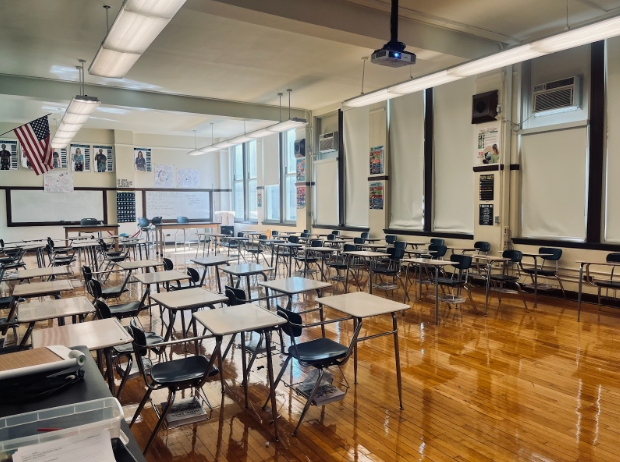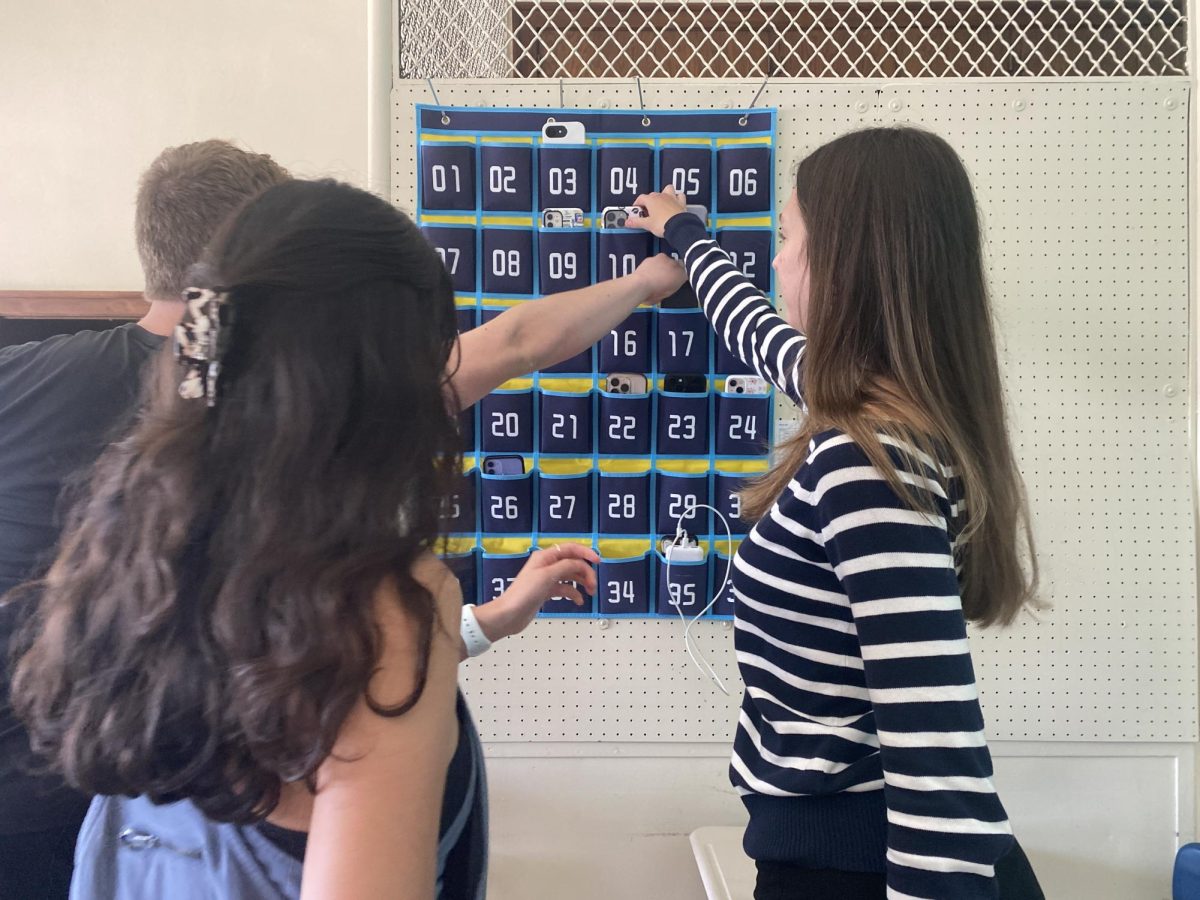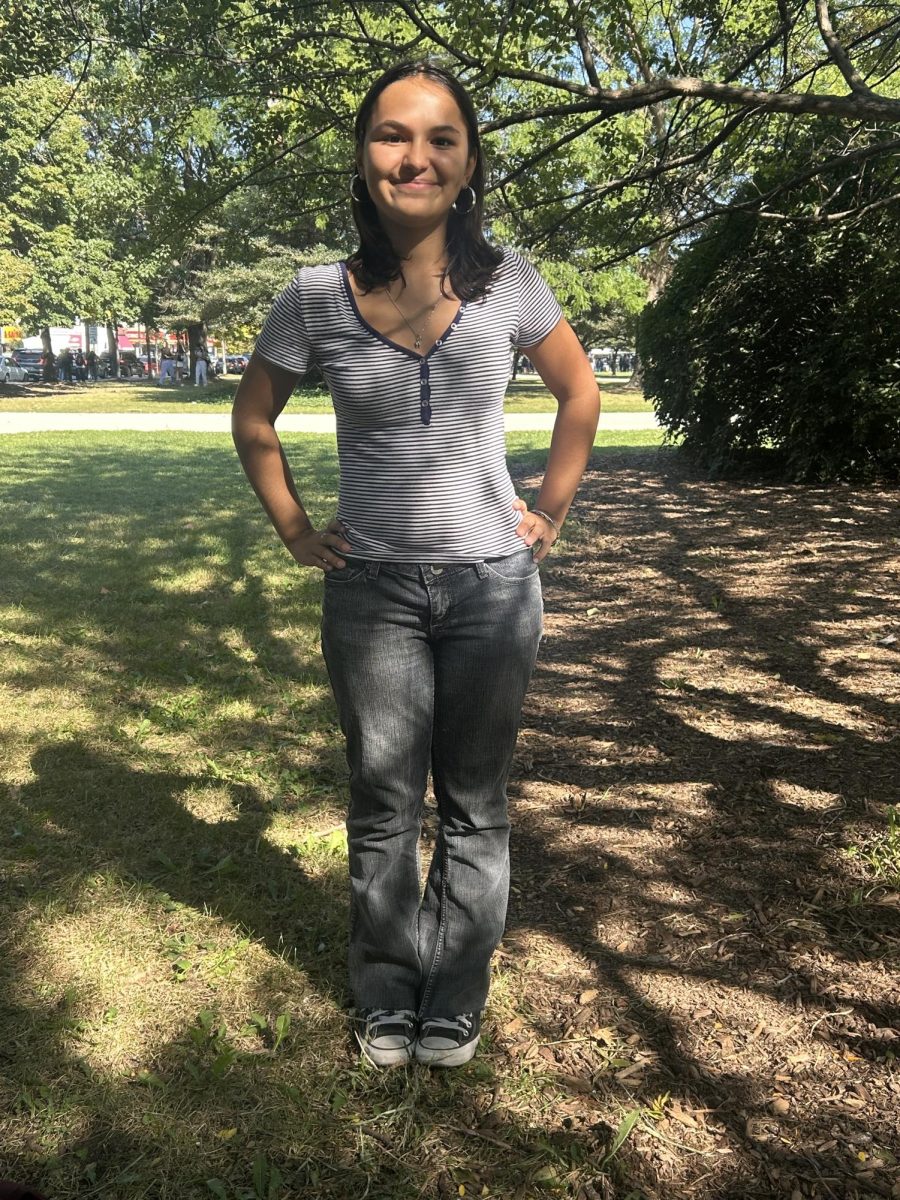By Evangeline Lacroix
It was only two days since the last time she saw him, but he was so skinny. Never this skinny before. Elena Lara’s father was locked in a jail cell being held by Immigration until they could deport him back to Mexico.
Three years ago, Lara’s father was pulled over while driving his car. He was arrested and three months later he was deported.
“Family life has been different without [my father],” said Lara, Div. 664. “I was really attached to him. On the weekends we would go out to the movies. I sometimes miss hugging him. It is a little hard, but I know he didn’t want to leave.”
Now, Lara is only able to contact her father by phone.
With her husband gone, Lara’s mother works even harder to support Lara and her sister.
“My mom works in a factory,” Lara said. “ It is really hard to see her come home because she has had such a hard day and she is tired. I try to help her as much with the cleaning in the house because I don’t want her to do more. It is hard because she comes home and complains about work. She does it because she cares, and she wants a better future for us.
Lara is just one more in a sea of undocumented children.
As a way for students to advocate and promote immigration reform and undocumented students’ rights, the Dreamers Club has been established by art teacher Ms. Moore.
“There are so many legal issues, and I hope to get information out to students to help them feel empowered and more comfortable,” Moore said. “I think there is a large population at Lane that feel like they need to hide. I know other teachers and the counselors support them. I feel like [the support] needs to be vocalized more, and let [these kids] know that they are equals among their peers.”
Another student that hopes to make a change is Daniel Hernandez, Div. 475. In his spare time he works with Immigrant Youth Justice League, an organization that rallies for immigration rights.
Hernandez came to the U.S. with his little sister and mother in 2004 when he was seven to meet his dad who came the year before. The process was arduous. He was awoken at four in the morning to get on a plane to Northern Mexico from Mexico City. At the airport he said goodbye to the family he was leaving behind.
Once off the plane, he waited in an abandoned house with 15 other people waiting for men to come to drive them across the border.
“I remember the house was run down and scary,” Hernandez said. “I did not know what to do. My mom was talking to the other people, gaining support. I was with my little sister. I was just trying to stay calm. Everything was strange, everything was new.”
When the men came, he got in the car with his family and drove to the border.
“I remember my mom clenching my hand really hard. She was really nervous,” Hernandez said. “I remember the guy at the border shaking our car, looking at our car, looking at everyone in the car really closely. Making eye contact with my mom. Looking at the driver, and making eye contact with the driver. Then he just gave us the thumbs up and we got going. My mom hugged me really tightly. It was such a relief.”
From New Mexico (where he crossed into the U.S) he took several Greyhounds to get into Chicago. Entering Chicago was a sensation of awe. The skyscrapers were fascinating. The roads were paved. The people on the street looked different than the people at home. Getting off the bus, he was reunited with his father after a year and a half of separation.
“We got our little bag that had a portrait of our family, our other bag was taken at immigration. I remember getting off the bus and seeing my dad and never running so fast towards him, and never hugging him so tight.”
In 2001, the DREAM (Development, Relief, and Education for Alien Minors) Act was introduced to U.S Senate by Illinois Senior Senator Dick Durbin in hopes of passing and turning into a law. In 2012, the DREAM Act has Transformed into the Deferred Action for Childhood Arrivals (DACA), which still has not passed. Even though there is no national law for undocumented students, there are individual laws in 13 states, including Illinois.
The Illinois law allows for undocumented students who have a taxpayer number to get scholarships through the State Treasurer’s College Savings Pool and the Illinois Prepaid tuition Plan. Students can pay in state tuition in public colleges and universities in Illinois. It also established the Illinois DREAM fund commission, and requires high school counselors to be trained to deal with undocumented students.
Every month the Dreamer’s Club meets twice.
On the first Friday of the month, a speaker comes in to talk to students about different immigration topics. These speakers include counselors that talk about applying to college as an undocumented students, past Lane alumni who (as undocumented students) have gone to college, and an immigration lawyer that will talk about the path to citizenship as an undocumented student.
On the third Friday of every month, club members come together to brainstorm ideas and start projects that advocate for topics talked about in the last meeting. This could include: letter writing, poster making, and fundraising.
For Lara, the idea of going to college is a complicated issue. Born in Mexico, she came over the border when she was eight months old with her older sister and parents. Initially, she lived in California until she was four. That same year, her parents decided to move back to their hometown in Mexico. A year later, the Lara family crossed the border again, this time setting in Chicago for good.
“It is clear that [in the U.S], there are better opportunities,” Lara said. “[There is] better education. In Mexico, it‘s a poorer country, so there are less job opportunities.”
There is even a difference in mindsets when thinking about school. Lara’s cousins see school in a different light compared to herself.
“I am more focused on school, trying to do good,” Lara said. “[My cousins] are more focused on where they are going on the weekends. I feel like they should focus more on school.”
Celso Ramos, Div. 475, was born in Brazil and became a naturalized citizen when he moved with his family while in the third grade.
“In Brazil, the public school system is really, really bad,” Ramos said. “Usually if you want a good education, you go to a private school. [In the U.S] even the education is better. There are a lot more resources and the teachers are more committed.”
For Ramos, the transition into a new school was hard. He did not speak English, and was put in a Spanish bilingual class that was no help. He only spoke Portuguese.
“I remember asking my step dad stuff,” Ramos said. “He is American, and I used to ask him [about] words, but most of the time they weren’t the right words. I would ask him bad words, the stuff I would hear in class. And he would tell me, and that would help me out, but it was really really hard. It was me and my little brother, and it was just like a whole other world.”
For Hernandez, the transition from a Mexico public school to an American public school was difficult as well. He spoke no English and struggled with the reading in his third grade class. Many nights he would stay up until midnight with his mother. It was stressful, and sometimes the work caused tears of frustration.
It was not until a woman at their church, Margarita, took Hernandez and his mom “under her wing.” They would go to Margarita for help with his homework. She would explain the materials in ways the school could not.
Now in high school, as these students get older, the thought of college and being able to afford school becomes a topic to think about.
As a sophomore, Lara has a lot of anxiety about college. Because of her legal status, it is extremely hard to afford an education. There are limited scholarships, and she is not eligible for FAFSA since she does not have a Social Security Card.
“There is [a pressure to maintain my grades] because if I get better grades, there is an opportunity to get a visa because I’m a good student,” Lara said. “For kids who are born here,they get government help with FAFSA. They can have Cs, but because they are born here, they can still get help. Where as for me, it is going to be harder because I am an average student and I wasn’t born here.”
Even though Ramos is a legal resident, there is a problem with his Green Card that is restricting him from applying to college. When he renewed his green card, one of the dates on the card was wrong. Because of this problem, colleges see him as undocumented because he cannot put down any personal information.
“I remember thinking ‘oh I am not going to college’,” Ramos said. “And I don’t want [other] people thinking like that. I want people to know that even if they are not legal, they can go to college. I think that is something anyone can do no matter what, giving [people] at least the opportunity to pursue their dreams. Education is not something that is OK to take away from someone no matter what.”
Through the Deferred Action for Childhood Arrivals (DACA) Program, Hernandez was able to get a social security card. He will be able to stay in the country for at least two more years, and apply to college. DACA does not change the legal immigration status, alter an individual’s existing immigration status, or provide a path to citizenship. What it does is allow people to work in the U.S if they meet the requirements, and they can renew the authorization every two years.
There are no federal or state laws that prohibits colleges and universities from accepting undocumented students. College is still an option for undocumented students.
Merit based aid and state aid in states that have their own DREAM Act can be given to students.
If a student is undocumented, he or she is encouraged to tell their counselors about their status, in order for their counselor to help them through the college process.
Counselors are under a confidentiality agreement, and cannot share the status of residency of students to authorities.
Counselors have resources such as the Illinois Association for College Admission Counseling website. Which directs students to colleges that normally accept undocumented students.
Counselors also have a resource called the Dream Activist: Undocumented Students Action & Resource Network that sets potential scholarships.
Ophelia De La O, Div. 463, club president, hopes that the club will be able to spread by word of mouth, creating similar clubs in other schools. She believes many schools are not as fortunate as Lane in the sense that other schools do not try to help undocumented students prepare for the future. She thinks it is important that the students stand up in order to help as many people as possible.
“We plant the seeds, [and] the roots spread,” De La O said. “We are targeting students that want to see changes in immigration rights, that want to take part in advocating for immigration rights and educating undocumented students. Through the people we talk to, we network and educate the community. We can preach to the world, but if you don’t have have people that know what they are talking about, then you take three steps forward, and two steps back.”
For a future club activity, she hopes to set up a network of schools that can come together with a dinner. At these get-togethers, she hopes people from all walks of life can come together to share stories and resources, building a community of undocumented students and activists. The club exists to help support people like Hernandez, Lara, and Ramos. Through outreach and advocating, the club hopes to inform people of their rights, and help people take action.
“We have to stand up,” Lara said. “We have to make ourselves known. We are not hiding. We are here to be apart of this country. […] It makes me happy to know that people care and that they are open minded and that they know are struggle. And they know that we are not here to harm anyone, we are here to better ourselves, even the country, if we can make a difference.”




